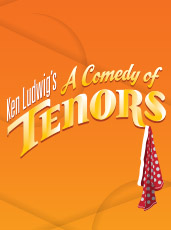
 by Bob Rendell
by Bob Rendell
read review on TalkinBroadway.com
Ken Ludwig’s most successful and widely produced play, Lend Me a Tenor, opened in the West End in 1986, arrived on Broadway in 1989, and has since been ubiquitous on American stages. Last season, thirty years after Tenor’s London debut, Ken Ludwig delivered a sequel called A Comedy of Tenors, which was co-produced by the Cleveland Playhouse (how appropriate, given the first Tenor’s Cleveland setting) and the McCarter Theatre.
In 2013, Paper Mill Playhouse presented a top-flight revival of Lend Me a Tenor directed by Don Stephenson. Serendipitously, Paper Mill has reunited Stephenson and his five 2013 principal cast members whose roles have been ported over to the sequel. Okay, Jill Paice plays a different ingénue role here, but there is little discernible difference among ingénues. There is no need to have any familiarity with Lend Me a Tenor to fully enjoy A Comedy of Tenors. While those familiar with its predecessor will enjoy the cleverness with which Ludwig has worked out variations on his original creation, those unfamiliar with it have a fresher experience.
As Comedy begins, two years have passed since the disaster filled night in 1934 when the chronically perturbed Cleveland Opera Manager Henry Saunders brought famed Italian tenor Tito Merelli (“Il Stupendo”) to town to sing the title role in Verdi’s Otello. Now, Saunders is fulminating in a Paris hotel adjourning a soccer field where in less than three hours “The Concert of Three Tenors” which he is producing is scheduled to begin. With his much abused assistant Max, Saunders is again awaiting the delayed arrival of Tito and his wife Maria. Max, who had to step in for the out of commission Tito two years earlier in Cleveland, is now also an opera singer as well as Saunders’ son-in-law and one of the evening’s three concert tenors. After Tito and Maria finally arrive, Tito goes off with Maria for a nap as all present leave the room. Tito’s removal of a blanket from the sofa reveals (only to us) Mimi, Tito’s 25-year-old daughter whose imaged virginity Tito wants to preserve, and her lover, clothed only in their undies, in flagrante delicto. Farcical complications ensue which lead the despairing Tito to believe that Mimi is having an affair with Maria’s boyfriend.
Saunders now learns that his third tenor, the Swedish Jussi Björling, has abandoned the concert because of the passing of his mother. However, Saunders miraculously manages to corral the young and ascendant young tenor Carlo Nucci to replace Björling. One complication is Tito’s fear that he is fading and that Carlo is eclipsing his prominence. A bigger complication is that Carlo … well, you can probably figure it out.
And if that is not enough for this swiftly paced hour and forty-five minute farce, there is also the opera singing bellhop Beppo, who is a ringer for the recalcitrant Tito, and the arrival on the scene of Tito’s ex-lover, the passionate soprano Tatiana Racon.
John Treacy Egan is the standout farceur in the leading dual roles of Tito Merelli and the bellhop Beppo. I do wonder whether I was the only misguided audience member who thought for a time that Egan was Tito pretending to be Beppo rather than an additional character. It’s always a pleasure to see the redoubtable Judy Blazer, who is an ideal match for Egan as Maria. Michael Kostroff, fresh from his portrayal of Max Bialystock in Paper Mill’s production of The Producers, is again fulminating against his misfortune. David Josefsberg (Leo Bloom in the Paper Mill The Producers) is drolly charming as Max. His sweetness adds an important, welcomed warmth throughout, and, most tellingly, at Comedy’s conclusion.
Jill Paice (Mimi) and Ryan Silverman (Carlos) bring charm and likeability to the youthful romantic roles and are spot-on when called on to participate in farcical interplay. Donna English is delightful as the tempestuous Tatiana Racon.
Michael Schweikardt’s lush and elaborate set design and Mariah Hale’s lovely costumes delightfully transport us to a luxurious place in a bygone era. Director Don Stephenson’s production is an extremely well-oiled mechanism.
Egan, Silverman and Josefsberg treat us to a both true to their characters and stirringly well sung “Libiamo” from La Traviata.
A Comedy of Tenors is not the real turtle soup. It is more Ray Cooney than Georges Feydeau or Alan Ayckbourn. The great farces have important issues at stake, emotionally involve us in their characters, and are very rare. However, an afternoon or evening of precisely staged, cleverly and craftily constructed, consistently amusing escapist entertainment is its own reward.

Comments are closed.